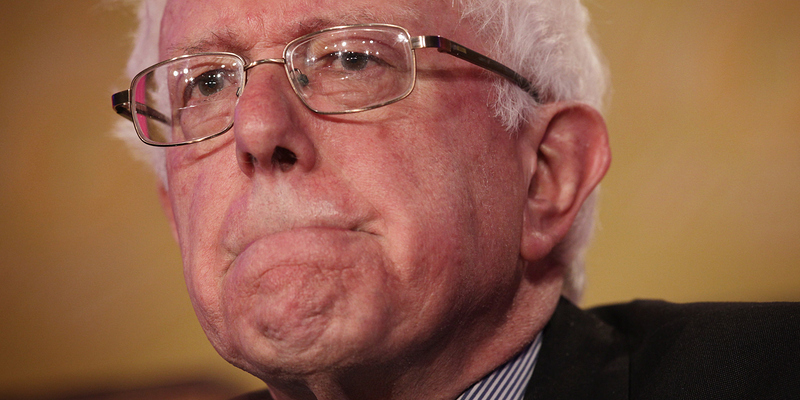So it turns out, Hillary won the Democratic Party’s nomination. Most people are mad or disappointed and a majority of them think it’s important to support Clinton against Trump. The argument is that in this historic election, a worse-than-Reagan character is intending not only to further privatize the US government operations and infrastructure but undo the great cultural march forward undertaken by the leftist liberals in America during the last three decades. On the other hand, the social media is filled with disdain for Hillary by radicals and Bernie Sanders supporters. Those who passionately supported democratic scialism in the last 12 months are vowing to never vote for her and instead support a third party candidate or, worse, stay home altogether and boycott the elections.
These are all valid and important debates, however, nobody is ready yet to look critically at Sanders and his campaign, to see if there was anything from his side that could have contributed to his defeat. It is important to address this question because in doing so, we might be able to better answer the classic leftist question of What Needs to be Done in regards to the November elections. Here are the points that come to mind as to why Sanders lost the Democratic primaries.
Early on, Sanders was not ready or confident about winning. This psychologically self-made glass ceiling was fundamental to his other errors, some of which are listed below. When one is not convinced of having any chance of winning a battle, sticking to the original arguments and hoping to make a symbolic impact hinders the flexibility needed to navigate towards victory.
Sanders should have chastised Clinton for a number of issues which either were never part of the original Sanders arsenal or entered when it was way too late. To start, Sanders should have gone after her for setting up a private email server. He should have linked this breach of procedure to her disastrous foreign policy around the world. Clinton should have been ethically and politically indicted throughout the campaign for destabilizing the US relationship with Russia and for “geopoliticizing” the Arab Spring (making it an instrument of the US hegemonic war with Russia and China), a cardinal sin which resulted in the chaotification of Egypt and destruction of two other Arab countries, namely Libya and Syria.
Sanders never went after Obama and instead pretended to be his true heir. This was a flawed strategy with fatal consequences. One can argue that besides a few small differences, there were and continue to be no real positions taken by Clinton on a number of key issues that were fundamentally different than how Obama had acted all throughout his presidency. Sanders should have drawn similarities between the two and advocated for true change away from the Obama policies and their Clintonian consequences.
On the epistemological level our time is marked by a new understanding of the functional aspect of democracy not as a fair and ethical system but a process that needs to be gamed if not hacked. Sanders unfortunately based his campaign on a return to true democracy rather than strategically using his resources to take advantage of the possibilities that this flawed system offered him in he 21st century. Thus, instead of complaining about Clinton subverting the system, he should have also sought to subvert the system himself.
Sanders’ team had no real plan to combat let alone halt voter suppression and other manipulation of primary elections colluded on by Clinton and the DNC. Having no plans prior into entering a battle with a shrewd politician who already had learned many lessons from the 2008 primaries was more tragic than wishful thinking.
Sanders underestimated the power of minorities in diverting attention away from his universal, class-based message. He did not pay enough attention to more local and human rights-level grievances. This should have been clear to his team right after their first encounter with #BLM. Unfortunately, staying the course with his class-based politics and reluctance to incorporate intersectionality into the campaign’s message haunted him until it was too late for him to overturn the general perception about his attitude towards and popularity amongst visible minorities particularly the African American community.
Waiting for endorsement from Elizabeth Warren was a fatal mistake. Warren was predisposed to enter the scene as a Hillary supporter. Sanders should have nominated a strong and experienced woman of color like Nina Turner as his running mate earlier on to double his own celebrity power and show that he really meant business when it came to being serious about anti establishment political change and the plight of African Americans.
Instead of only critiquing the criminal justice system and its racist biases, Sanders should have called for an amnesty for all those who had been incarcerated for drug-related and non violent crimes. The conservative response to such a bold move from Clinton would have exposed the conservative core of her campaign, making her vulnerable amongst African American voters.
It was clear from the day 1 that that Sanders never had the mainstream media. The place of mass media in subverting the primaries should have been part and parcel of his campaign not just a “radical” point pushed on social media by the fringe elements from his side. Equally, the energy spent on seeking fair treatment from mainstream media should have been spent on endorsing one or two outlets as semi-official platforms for his message and side of the news, in order to combat Hillary’s full-spectrum media dominance.
The amount of art, graffiti and political murals, memes and other kind of digital and non digital graphics created in support of Sanders during his campaign was phenomenal. However, there wasn’t an effort made by his campaign to use this power to full advantage. These distributed efforts remained localized and hardly connected with his campaign advertising. Sanders was supported by a great number of artists, famous or otherwise, as reflected on his web site. He never really found a way to flaunt these actors, musicians, writers, poets and visual artists and make a point about being a pro-art & -creativity candidate.
Reviving democratic socialism in America was a noble cause but the campaign remained focused on America and had little to say about the exercise of USA as the only global superpower. Sanders should have more assertively structured his campaign as not only the revival of class struggle but a much needed anti-war movement to internally pressure the largest military hegemon in world history to abandon the use of military for settling its political and economic disputes.
Bernie Sanders presented himself as the uncompromising candidate but realpolitik operates in the field of compromise. Like Obama, he could have hedged “his soul” quite a bit earlier on with Hillary’s backers by highlighting her vulnerabilities to Trump, without watering down his message. His puritan notion of ethical standards alienated superdelegates and softer capitalists. If he was going to end his campaign with the grand compromise with Clinton, why not do some amount of this earlier on?
Sanders promised people a contested convention and prepared his delegates for a real democratic showdown in the style of Chantal Mouffe’s and Ernesto Laclau’s concept of Radical Democracy. Then he totally changed posture and endorsed Hillary on the eve of the convention. This sudden shift was damaging both to his own credibility and his supporters as well as the DNC, who had to deal with disgruntled delegates that for months had been preparing for a real political struggle inside the party. In addition, his contestation of the primary probably would have not changed the course of the nomination but could have provided the possibility for substantial compromises with Clinton during the convention.
Sanders was essentially a leftist reactionary candidate unfamiliar with new tendencies within the leftist thought. He could have benefitted from encouraging his team to do more research on the ideas side of things. He could have taken up issues of privacy and the emergence of artificial intelligence, automation and universal basic income to his heart and crafted a totally new leftist campaign appropriate for the 21st century. But instead he stuck to the Fordist social democratic values of the 20th century, hoping to convince people that a return to the past is not only possible but necessary.
Sanders and his team were lucky they had millions of young digital natives at their disposal to update and modernize their communication strategy, but the campaign itself was completely old school. He could have benefited from taking a page or two from Trump’s playbook concerning how one can use a changing and precarious personality online to attack an opponent, making over the top demands and comments to expand his media coverage’ Like Trump he should have exercised running towards his enemy and encouraging controversy, rather than remaining on the defensive for the duration of his campaign.



